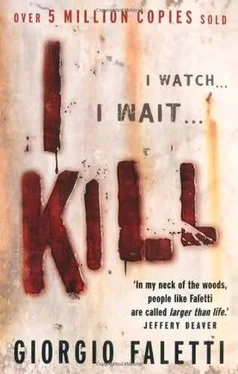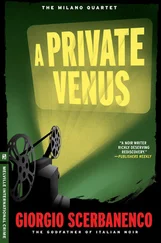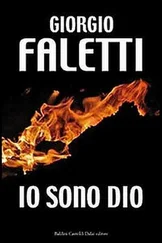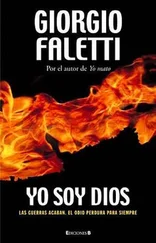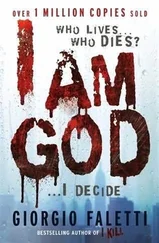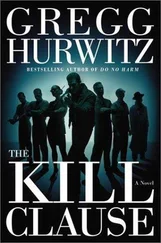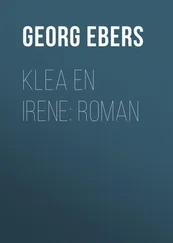Now, finally, everything is white.
The man is leaning his shoulders against the wall of a small, rectangular room. He is sitting on the floor, holding his bent knees and watching the movement of his toes in white cotton socks. He is wearing a jacket and trousers of rough white cotton, as white as the walls that close him in. There is a metal bed against the wall in front of him, screwed to the floor. It, too, is white.
There are no sheets, but the mattress and pillow are white. There is a white light coming from the ceiling, protected by a heavy grating, hastily painted white: the source of the blinding brightness in the room.
The light never goes out.
He slowly raises his head. His green eyes look carelessly at the tiny window, placed so high that it is unreachable. It is the only marker for the passage of time. Light and dark. White and black. Day and night. He doesn’t know why, but he can never see the blue of the sky.
His solitude is not a burden. Actually, he is irritated by every intrusion from outside. Every once in a while, a slot opens in the bottom of the door and a tray with plastic bowls slides inside. The plastic is white and the food always tastes the same. There is no cutlery. He eats with his fingers and returns the tray when the slot opens. In exchange, he receives a white, damp cloth to clean his hands. He must return it immediately.
Every so often, a voice tells him to stand in the middle of the room with his arms out. They check his movements from a spy hole in the middle of the door. When they see that he is in the right position, the door opens and several men come in. They put his arms in a straitjacket and tie it behind his back. He smiles each time they put it on him.
He feels that the powerful men in green are afraid of him and try as hard as they can to avoid his gaze. He can almost smell their fear. Still, they should know that his time of struggle is over. He has said it over and over again to the man with the glasses in the room where they take him. The man who wants to speak, to know, to understand.
He has also told him over and over that there is nothing to understand. There is only acceptance of what happens and what will continue to happen, just as he accepts being enclosed with all that white until he becomes one with it.
No, his solitude is no burden.
The only thing he misses is music.
He knows they won’t let him have any, so sometimes he closes his eyes and imagines it. He has played so much and listened to so much and breathed so much that if he looks for it, he finds it intact, exactly the same as the moment when it entered him. He is no longer interested in memories, the ones made of images and words – faded colours and hoarse sounds corrupted by the search for meaning. In his prison, the only use of memory is to locate the hidden treasure of all the music he possesses. It is the only legacy left by the man who once claimed the right to be called Father, before he decided that he was no longer that man’s son and took away that right along with his life.
If he concentrates, he can hear the music as well as if an agile hand were winding its way down the neck of an electric guitar right in front of him, a furious solo running along a scale that turns and travels higher and higher and never ends.
He can hear brushes grazing across the drums or damp, hot breath fighting its way through the tortuous funnel of a saxophone, becoming the voice of human melancholy, the sharp pain of regret for something wonderful that has crumbled in our hands, corroded with time.
He can find himself in the middle of a string section and watch the light, rapid movement of the first violinist’s bow, or slip unnoticed between the sinuous flourishes of an oboe, or stop to observe the well-trimmed nails of the fingers that fly nervously over the harp strings like wild animals behind the bars of a cage.
He can turn the music on or off whenever he wants. And like all imaginary things, it is perfect. He has everything he needs inside him: all his past, all his present, and all his future.
Music is more than enough to defeat the solitude. Music is the only promise kept, the only bet won. He told someone once that music is everything, the beginning and the end of the journey, and the journey itself. They listened to him, but they didn’t believe him. But what can you expect from someone who plays music and hears music but doesn’t breathe it?
No, he has no fear of solitude.
Then again, he is not alone. Never, not even now.
No one has ever understood and perhaps no one ever will. That is why they always look so far away for what is right before their eyes, like they will always do. That is why he was able to hide for so long amid all those hurried glances, the way black can hide amid other colours. None of them could accept the blinding whiteness of a room like that without screaming.
He doesn’t need to scream. He doesn’t even need to speak.
He leans his head against the wall and closes his eyes, removing them only for an instant from the brightness of that room, not because he fears it but because he respects it.
He smiles as the voice reaches him inside his head, loud and clear.
Are you there, Vibo?
When one comes to the end of a labour of this kind, expressing one’s gratitude is obligatory but it is also a personal pleasure. And so, without further ado, let me begin by thanking the American Embassy in Rome, the Federal Bureau of Investigation, and the Sûreté Publique of the Principality of Monaco, for the assistance they provided to a person who introduced himself as a writer but who, at that time, was a writer only in his own mind.
Thanks to Gianni Rabacchin, Assistente della Polizia di Stato in Asti, and to Maresciallo (warrant officer) Pinna of the Carabinieri of Capoliveri, who are more than names and ranks in uniforms – they are also my friends.
The same is true of Dr Gianni Miroglio and Dr Agostino Gaglio who, in a world of powermongering physicians, are two genuine gentlemen of medicine. Let me add to the group Professor Vincenzo Mastronardi, a clinical criminal psychiatrist, who holds the chair of Forensic Psychopathology in the Department of Medicine at the University of Rome La Sapienza; despite his countless obligations, he managed to find the time to offer me practical and technical advice that was as invaluable as his friendship.
My acknowledgment and gratitude goes out as well to Alberto Hazan and the staff of Radio Monte Carlo, with a special mention for Alain Gaspar, who accepted and assisted me in all my incursions with a truly laudable savoir-faire. And thank heavens for his Italian, far superior to my own French…
I should mention and thank my good friend Jeffery Deaver who demonstrated, forkful of polenta in hand, that a great author can also be a modest and likable human being.
Speaking of books, my thanks go to Claudia and Alberto Zappa for a number of volumes that I may continue to ‘borrow’ for ever…
Heartfelt thanks go out to my ‘supporters’, a team of conscripted readers, including Doretta Freilino, Mauro Vaccaneo, Laura Niero, Enrico Biasci, and Roby Facini, who supplied me with fuel and new tyres in my frequent and perhaps slightly demanding pit stops.
I would like to thank Roberta, who is always there, and who always understands; how and where, if you don’t mind, are exquisitely matters that concern only the two of us.
Thanks to Piergiorgio Nicolazzini, my literary agent, who agreed to take on an aspiring writer practically ‘on faith’. And for the same reason, thanks to Alessandro Dalai, Eugenio Rognoni and everyone at Baldini & Castoldi, with a special note of gratitude to my editor Piero Gelli for his invaluable advice, which allowed me to escape the ‘Matarazzo Syndrome’, and to Paola Finzi, a heroic editor who managed to walk unsuspectingly into one of my infrequent temper tantrums.
Читать дальше
